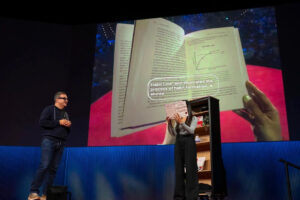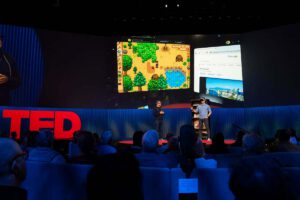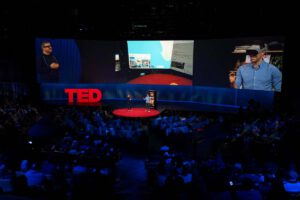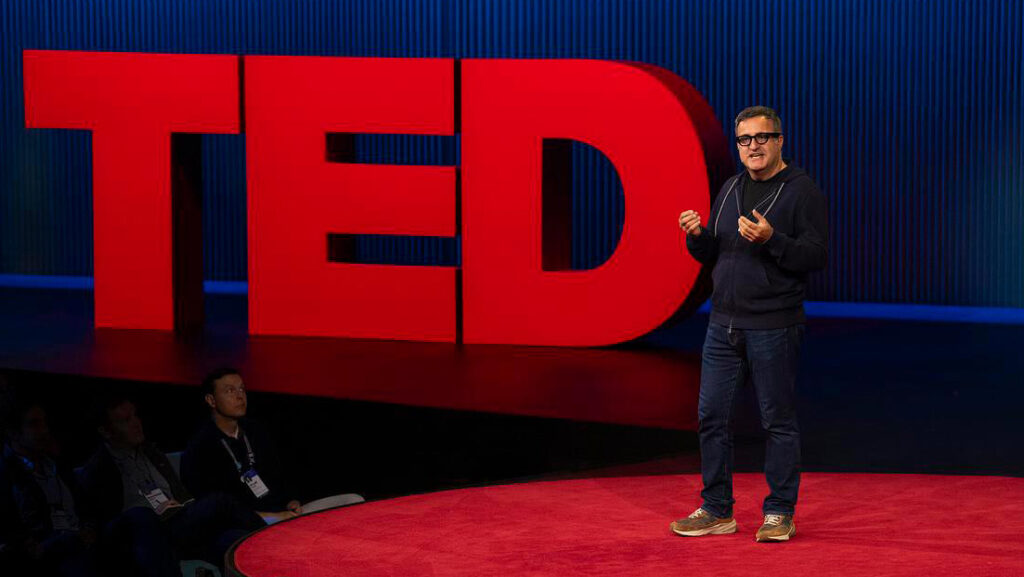Last week at TED 2025 in Vancouver, Google made a significant splash by showcasing their prototype Android XR glasses and Samsung’s Project Moohan VR headset. This marks the first public demonstration of Google’s AR technology since the Android XR announcement last December, giving us a tantalizing glimpse of what’s to come in wearable tech.
What Was Shown
Google’s head of augmented and extended reality, Shahram Izadi, took the stage wearing what appeared to be fairly normal-looking glasses. Unlike the bulky form factors we’ve seen with previous AR attempts, these glasses were notably sleek and lightweight – something you might actually want to wear throughout the day.
The standout feature demonstrated was something Google is calling “Memory” – an AI-powered recall system that leverages Gemini to remember where you last placed items. In a compelling demo, product manager Nishta Bathia asked, “Do you know where I last left my hotel key card?” and Gemini promptly responded, “The hotel key card is to the left of the music record,” referring to a specific location on a shelf behind her.



Other features showcased included:
- Real-time language translation: Converting spoken Farsi to English text displayed directly on the lens, with Nishtha even demonstrating bilingual conversations by speaking to Gemini in Hindi
- Content creation: Having Gemini generate a haiku about the TED audience on command
- Seamless smartphone integration: Allowing the glasses to remain lightweight by offloading processing to a connected smartphone
As Izadi explained: “These glasses work with your phone, streaming back and forth, allowing the glasses to be very lightweight and access all of your phone apps.”
The Technology Behind It
These glasses appear to be the evolution of Project Astra, which Google first demonstrated at I/O 2024. The core technology uses computer vision and AI to understand spatial relationships and context, essentially giving users an AI-powered photographic memory that can recall where objects were last seen.
According to multiple reports, the glasses include at least one built-in display (possibly with models in development featuring displays in both lenses), a camera system for visual perception, and microphones for voice commands – all while maintaining a form factor that’s nearly indistinguishable from regular glasses.
The smartphone-tethered approach Google is taking differs from competitors like Meta’s rumored standalone glasses. By offloading the heavy processing to a connected phone, Google can keep the glasses slim, lightweight, and potentially offer better battery life.
Here’s the original Project Astra demo from I/O 2024, which appears to be the foundation for the memory features shown at TED:
Samsung’s Project Moohan Also Makes an Appearance
Google didn’t stop at just showcasing their AR glasses. They also demonstrated Samsung‘s upcoming XR headset (codenamed Project Moohan), which appears more similar to Apple’s Vision Pro with immersive pass-through video capabilities.


The headset demonstration showed:
- Multiple overlay windows for productivity
- Bird’s-eye view of Cape Town, South Africa with Gemini providing insights
- 360-degree snowboarding video with AI analysis
- Stardew Valley gaming with AI assistance
Unlike the glasses, which focus on lightweight, ambient features, the headset is positioned as a more powerful immersive computing platform. Reports suggest the headset could be priced around $2,500 when it launches.
Potential Impact
What’s particularly exciting about these glasses is the potential real-world applications. Beyond simply finding lost items, the implications for people with memory challenges are profound. As one TED attendee noted, “I think of my own grandparents who suffered from dementia. If something like this had existed earlier, it could have improved their quality of life dramatically.”
The technology journalist Victoria Song, who tested an early version of the platform last December, described the experience as feeling “as close to Tony Stark in a controlled demo as I’ll ever be,” with Gemini functioning as her “Jarvis.”
What’s Next?
While neither Google nor Samsung shared specific release dates during the TED presentation, the public demonstration suggests we might be getting closer to an actual product launch. Several reports hint at the possibility of announcements at Google I/O 2025 next month, and industry analysts suggest Samsung’s Project Moohan headset could be available by the end of this year.
According to South Korean news portal ETNews, Samsung might also be planning a smart glasses product codenamed “Haean” for this year, which could potentially be using some of the technology demonstrated at TED.
My Take
What stands out most about these new AR glasses is their normalcy. The form factor appears to have finally reached a point where the technology can fade into the background, becoming an ambient, helpful extension of our digital lives rather than an obvious piece of tech strapped to your face.
The integration with Gemini also marks a significant shift – rather than creating a standalone AR platform, Google is leveraging its AI strengths to make these glasses immediately useful for everyday tasks, which feels like the right approach after years of tech companies struggling to find compelling AR use cases.
While we’re still clearly in the early stages, this TED demonstration gives me optimism that AR might finally be approaching its mainstream moment – not as a flashy sci-fi concept but as a subtle, genuinely helpful technology that enhances our daily lives through AI-powered assistance.
The real challenge now will be price and battery life – two hurdles that have historically prevented wearable tech from reaching mass adoption. If Google can solve these while maintaining the impressive functionality shown at TED, they might finally have a winning formula for AR.
What do you think of Google’s approach to AR? Would you wear these glasses if they make it to market?





